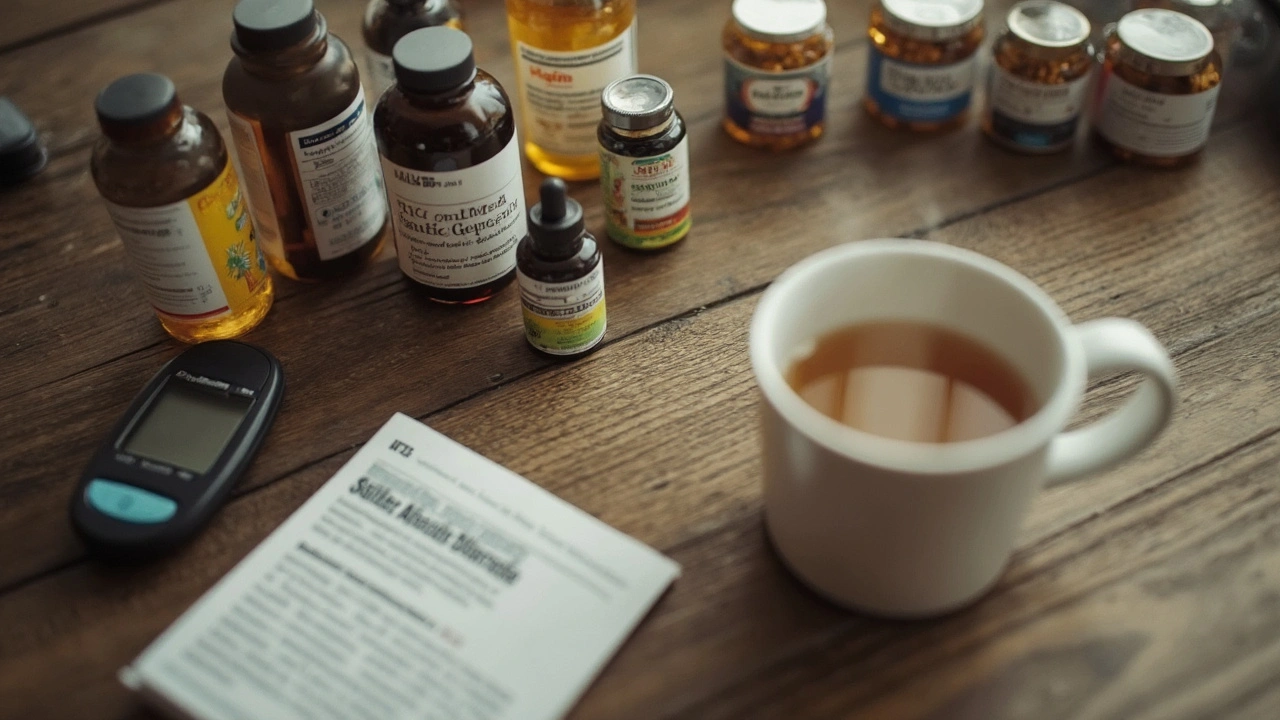The Real Story Behind Insulin Resistance and Why Supplements Are Trending
Startling fact: nearly one in three Australian adults sits in the range where their cells are struggling to use insulin right. If you've ever been told you have prediabetes or PCOS, or just find yourself desperately googling "why am I always sluggish after meals?", you're not alone. Most people think fixing this is all about eating less sugar, but that's only the beginning. Modern lifestyles—stress, poor sleep, sitting all day—set the stage for your cells becoming numb to insulin’s ‘open up’ signal, trapping glucose outside where it shouldn’t linger. Left unchecked, the risks pile up: type 2 diabetes, weight gain, brain fog, and heart problems all lurk quietly in the background.
Doctors love their prescriptions, but a surprising number of people want to try lifestyle tweaks or otc supplements first—maybe you’re one of them? It turns out, some non-prescription products get legit respect from researchers. I’m not saying they’re magic bullets, but combine the right supplement with solid habits, and you’re tipping the odds in your favour. Even in busy Sydney, where cafe culture never quite lines up with clean eating, more people are reaching for nature’s helpers before going straight to medication.
The tough part? There’s loads of hype and even more confusion. Shopping shelves are stacked with everything from cinnamon pills to berberine drops to that mystery stuff you only hear about on Reddit. What actually helps, and what’s just clever marketing? A bunch of smart folks have actually tested these products in real humans—not just lab mice. So, let’s get sharp about which ones really work, how they stack up in the research, and what red flags to keep in mind.
If you’re here hoping for a quick fix, sorry to burst the bubble—no supplement alone replaces smart food choices, exercise, and sleep. But choosing the right one can nudge your health in the right direction. The trick is to pick what’s safe, backed by solid data, and a match for your unique body.

The Supplements With Real Science Behind Them
Not all supplements are equal. Some have better research than others—so here’s a deep dive into the real heavy hitters. Each of these supplements gets its claim to fame from either lowering fasting glucose, improving insulin sensitivity, or cutting down risk factors like cholesterol or inflammation. Always read labels, watch out for dodgy brands, and get your doctor on board if you’re mixing with prescriptions.
- Berberine – This traditional herbal extract gets compared to metformin in several studies, showing drops in fasting blood sugar and improvements in HOMA-IR (that’s an insulin resistance test number docs love). Some call it a ‘plant metformin’—it nudges your gut bacteria, upregulates certain enzymes in your liver, and even dials down inflammation. In 2023, a Chinese review showed berberine dropped A1c by up to 1% in people with type 2 diabetes. Watch out: Berberine can mess with some antibiotics and blood thinners, so talk to your doctor first.
- Inositol – Actually two forms matter here: Myo-inositol and D-chiro-inositol. These B-vitamin-like molecules are lifesavers for women with PCOS and help both men and women become more insulin sensitive. Researchers saw fasting insulin fall and periods regulate in women using inositol. It’s gentle on the stomach, with barely any side effects at recommended doses.
- Magnesium – About half of Aussies (yep, HALF) get less than the recommended amounts. Not great, since magnesium plays a crucial role for pancreatic cells doing their insulin magic. Studies link low magnesium with being more insulin resistant. Supplements help people with low intake nudge their numbers toward normal—especially older adults, those under chronic stress, or people guzzling lots of coffee (it leeches magnesium).
- Cinnamon Extract – Before you start pouring it on your toast, know the research is inconsistent, but meta-analyses in 2022 show cassia cinnamon supplements may drop fasting glucose by up to 24 mg/dL over 12 weeks. The trick? You need a concentrated, standardized extract—sprinkling the kitchen spice doesn’t come close.
- Alpha-Lipoic Acid (ALA) – Beyond being a buzzword in skin creams, ALA can boost insulin sensitivity and fight off the free radicals that make insulin resistance worse. A 2021 meta-analysis found that daily ALA improves HOMA-IR scores and can help folks with nerve pain related to diabetes, which is a massive bonus.
- Chromium Picolinate – This trace element made headlines for the right reasons: clinical trials show up to a 30% drop in fasting insulin in folks with PCOS and borderline diabetes after a couple of months’ use. Just don’t go overboard; high doses can actually backfire on your kidneys.
- Gymnema Sylvestre – Called the ‘sugar destroyer’ in India, this herb blocks sweet receptors and may lower sugar absorption. There’s enough evidence to justify its spot in supplement stacks, especially for those struggling with cravings or high-carb diets. Researchers noticed small improvements in A1c and reduced post-meal sugar spikes in several trials.
Worth noting: Australia’s TGA (our medicine watchdog) isn’t as strict with supplements as with prescription drugs. Always stick to trusted brands and run anything new by a pharmacist or GP—especially if you’re mixing products or already taking medications.
Want to keep tabs on how the best options stack up against the biggest prescription player—metformin? There's a fantastic breakdown at this link about top natural and pharmaceutical metformin otc alternative choices, comparing real outcomes, side effects, and more. Handy if you’re weighing up all your options.
Pro tip: Don’t fall for the “more is better” trap. Doubling up doses can cause more harm than good. Even with natural products, subtle is smarter.

Smart Tips and Watch-Outs When Using OTC Insulin Resistance Supplements
You can be super keen for a quick win, but supplements aren't magic dust—they’re tools in a much bigger kit. Want to make your supplements actually work for you? Here’s how real people, not lab rats, get real benefits out of these evidence-backed products. Let’s skip empty theory and zero in on hands-on advice.
- Mix With Movement: All the berberine in the world won’t fix insulin resistance if you live on your couch. Aussie diabetes research found folks who added just 3,000 steps a day (about 25 minutes of walking) to their supplement game saw double the drop in fasting blood sugar compared to those who just took pills. Active muscles gobble up more glucose—you’re literally becoming your own insulin.
- Pick the Right Form: Magnesium glycinate is one of the top picks—not as likely to send you running to the toilet as magnesium citrate. With cinnamon, look for a cassia or Ceylon supplement tested for low coumarin (too much coumarin can hurt your liver). Read the label. If it sounds like marketing hype, it probably is.
- Consistency Is Key: Most clinical trials run for at least 8-12 weeks before expecting true results. Daily habits beat weekend enthusiasm every time. Set an alarm, leave supplements next to your toothbrush, do whatever keeps you on track.
- Start Slow, Watch Your Body: Some folks (especially with sensitive stomachs) do better easing in at half the recommended dose the first week, then increasing. If anything weird happens—rashes, tummy trouble—stop and get advice.
- Don’t Overlap Ingredients: Taking multiple supplements with the same active ingredient? You’d be shocked how fast you can double up on chromium or berberine just by stacking popular brands. One is enough—too many cooks spoil the soup, and in this case, your kidneys.
- Labwork Doesn’t Lie: Guessing rarely works. Check your fasting glucose, insulin, and HbA1c before you start. Recheck after 10-12 weeks. If numbers don’t budge, don’t chase more pills—something bigger is off (diet, sleep, or there’s a medical cause to catch).
- Side Effects Exist: "Natural" doesn’t mean harmless. Berberine, for example, can cause mild digestive issues, while ALA at high doses may cause nausea. Cinnamon in high doses might wreck your liver if it’s loaded with coumarin. Stay in recommended ranges and check for interactions if you take meds for blood pressure, blood thinners, or diabetes.
Spotting trends? Sydney’s local chemists are reporting a jump in demand for blood sugar support supplements—some even run out every few weeks. If you’ve noticed aisles suddenly empty, now you know why. It’s not just a social media trend; people are genuinely desperate for non-prescription help that works.
Here’s a neat snapshot showing what clinical studies say for each supplement:
| Supplement | Main Benefit | Key Evidence/Study |
|---|---|---|
| Berberine | Lowers fasting blood sugar, A1c | Zhang et al 2023, metformin-comparable results |
| Inositol | Improves insulin sensitivity (especially PCOS) | Unfer et al 2022, improved ovulation & insulin |
| Magnesium | Reduces insulin resistance, supports energy | Hruby et al 2020, population studies |
| ALA | Cuts inflammation, improves glucose metabolism | Mohammadi et al 2021, meta-analysis |
| Cinnamon | Lowers fasting glucose | Allen et al 2022, meta-analysis |
| Chromium | Lowers fasting insulin | Balk et al 2022, randomized trial |
| Gymnema | Reduces cravings, lowers postprandial blood sugar | Sharma et al 2021, clinical trial |
Smart shoppers look for real evidence, watch their doses, and don’t skip the basics—food, movement, and sleep matter more than any supplement bottle. But when you want a safe nudge and an edge, the right over-the-counter option could be exactly what you need to get that blood sugar under control, one step at a time.





Oh great, another miracle pill because sugar cravings are sooo hard.
Step right up, ladies and gents, to the theatrical debut of the “awesome supplement showdown”! Here we have berberine strutting like a seasoned actor, claiming to out‑perform metformin with a bow. Inositol enters the stage, whispering sweet promises to PCOS warriors, while magnesium shuffles in, trying to salvage the exhausted pancreas. Cinnamon extract makes a cameo, hoping the audience won’t notice the plot holes in its research. Alpha‑lipoic acid swoops in with a dramatic flair, promising to battle free radicals like a superhero. Chromium picolinate tries to steal the spotlight with a flash of insulin‑lowering fireworks. And Gymnema Sylvestre, the sultry anti‑sweet temptress, attempts to seduce cravings into oblivion. The curtain falls, but the audience knows the real magic lies in diet, movement, and sleep, not just the supporting cast.
I really liked how you laid out each supplement like characters – it makes the info easier to readr. The part about berberine being a “plant metformin” was especially cleer. Keep sharing stuff like this, it helps a lot of us who are just trying to figure out what works.
Yesss that’s the vibe! So simple but powerfull keep it coming
While the sarcasm is noted, it’s worth remembering that many people genuinely struggle with finding effective, evidence‑based options. If you’re open to it, trying a low‑dose berberine while tracking your glucose could be a safe first step, especially when paired with consistent movement and better sleep hygiene. Always consult a healthcare professional before mixing supplements with any meds.
Insulin resistance is a multifactorial condition that responds best to a combination of lifestyle changes and targeted nutrients. Berberine has repeatedly shown A1c reductions comparable to low‑dose metformin in randomized trials. Inositol, particularly the myo‑ and d‑chiro forms, improves ovarian function and insulin sensitivity in many women with PCOS. Magnesium status correlates with pancreatic insulin secretion, and supplementation can modestly lower fasting glucose in deficient individuals. Cinnamon extract, when standardized to ≥60 % cinnamaldehyde, may reduce fasting glucose by 5–10 mg/dL over three months. Alpha‑lipoic acid acts as both an antioxidant and a mitochondrial co‑factor, improving HOMA‑IR scores in diabetic cohorts. Chromium picolinate has demonstrated up to a 30 % decrease in fasting insulin in borderline‑diabetic subjects, but excess dosing can harm renal function. Gymnema sylvestre blocks intestinal glucose absorption and blunts post‑prandial spikes in small studies. Timing of supplementation matters; taking berberine with meals enhances its glucose‑lowering effect. Combining magnesium glycinate with vitamin D can synergistically improve metabolic markers. Consistent aerobic activity of at least 150 minutes per week amplifies the benefits of any supplement regimen. Sleep duration of 7–9 hours per night is independently associated with better insulin sensitivity. Regular monitoring of fasting glucose, HbA1c, and serum magnesium provides objective feedback on progress. Adjust dosages only after reviewing lab results and consulting a clinician. Remember that no single pill replaces balanced nutrition, regular movement, and stress management.